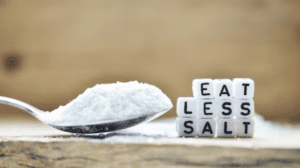
Reducing your daily salt intake by just one teaspoon has been shown to lower the top blood pressure reading as effectively as a typical hypertension medication, according to a recent study, even if you do not currently have high blood pressure. A teaspoon of salt equates to 2,300 milligrams, the recommended daily limit for individuals over 14 according to the latest US nutritional guidelines. However, the American Heart Association advocates for a diet containing less than 1,500 milligrams of sodium each day.
This groundbreaking study is the first to reveal that individuals who are already taking blood pressure medication can further decrease their blood pressure by limiting their sodium intake. Norrina Allen, co-principal investigator and professor of preventive medicine at Northwestern University’s Feinberg School of Medicine, stated, “Regardless of medication, we found that 70% to 75% of people are likely to experience a reduction in their blood pressure if they decrease the sodium in their diet.”
High blood pressure, often referred to as the “silent killer” due to the absence of symptoms, affects one in three adults globally and can lead to serious health issues such as heart attack, heart failure, kidney damage, and stroke, according to a 2023 report by the World Health Organization. The American Heart Association reports that nearly half of all Americans live with high blood pressure, and about a third of them have “resistant” hypertension, which does not respond to three types of medications used concurrently.
According to a 2021 study, men between the ages of 20 and 49 are up to 70% more likely to have uncontrolled hypertension than women of the same age. Dr. Andrew Freeman, director of cardiovascular prevention and wellness at National Jewish Health in Denver, noted that excessive salt consumption is prevalent in today’s diets due to its widespread addition to various foods. Despite a teaspoon of salt appearing small, it has a surprisingly significant impact on blood pressure, as indicated by Freeman, who was not part of the study.
The study, published in the journal JAMA, involved 213 participants aged 50 to 75, who were assigned to follow either a high- or low-sodium diet for one week. After completing one diet cycle, each person switched to the alternative diet. Of the participants, 25% had normal blood pressure, another 25% had untreated hypertension, 20% had their blood pressure under control, and 31% did not.
Read More : Exploring Ketamine: From Anesthetic to Therapeutic and Recreational Use